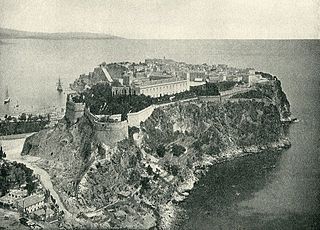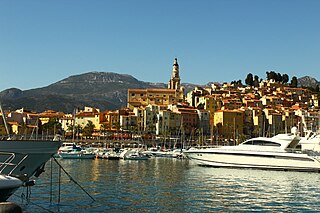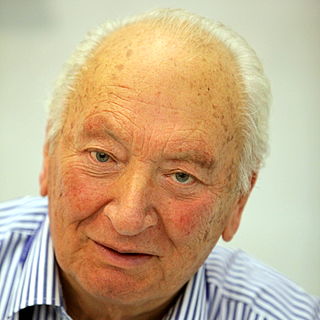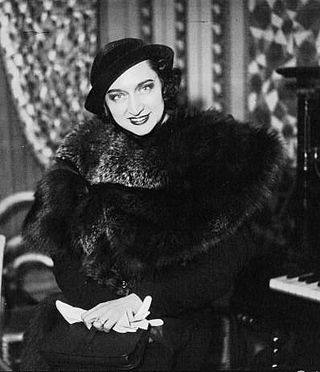
The early history of Monaco is primarily concerned with the protective and strategic value of the Rock of Monaco, the area's chief geological landmark, which served first as a shelter for ancient peoples and later as a fortress. Part of Liguria's history since the fall of the Roman Empire, from the 14th to the early 15th century the area was contested for primarily political reasons. Since that point, excepting a brief period of French occupation, it has remained steadily under the control of the House of Grimaldi.

Jean Genet was a French novelist, playwright, poet, essayist, and political activist. In his early life he was a vagabond and petty criminal, but he later became a writer and playwright. His major works include the novels The Thief's Journal and Our Lady of the Flowers and the plays The Balcony, The Maids and The Screens.

Joseph Kessel, also known as "Jef", was a French journalist and novelist. He was a member of the Académie française and Grand Officer of the Legion of Honour.

The French Riviera, known in French as the Côte d'Azur, is the Mediterranean coastline of the southeast corner of France. There is no official boundary, but it is considered to be the coastal area of the Alpes-Maritimes department, extending from the rock formation Massif de l'Esterel to Menton, at the France–Italy border, although some other sources place the western boundary further west around Saint-Tropez or even Toulon. The coast is entirely within the Provence-Alpes-Côte d'Azur region of France. The Principality of Monaco is a semi-enclave within the region, surrounded on three sides by France and fronting the Mediterranean. The French Riviera contains the seaside resorts of Cap-d'Ail, Beaulieu-sur-Mer, Saint-Jean-Cap-Ferrat, Villefranche-sur-Mer, Antibes, Juan-les-Pins, Cannes, and Theoule-sur-Mer.

Menton is a commune in the Alpes-Maritimes department in the Provence-Alpes-Côte d'Azur region on the French Riviera, close to the Italian border.

The Talented Mr. Ripley is a 1955 psychological thriller novel by Patricia Highsmith. The novel introduced the character of con man Tom Ripley, whom Highsmith wrote about in four subsequent books. Its numerous film and television adaptations include Purple Noon (1960), starring Alain Delon, The Talented Mr. Ripley (1999), starring Matt Damon, and the 2024 series Ripley, starring Andrew Scott.

Italian-occupied France was an area of south-eastern France and Monaco occupied by Fascist Italy between 1940 and 1943 in parallel to the German occupation of France. The occupation had two phases, divided by Case Anton in November 1942 in which the Italian zone expanded significantly. Italian forces retreated from France in September 1943 in the aftermath of the fall of the Fascist regime in Italy, and German Wehrmacht forces occupied the abandoned areas until the Liberation.

Joseph Joffo was a French author. A noted autobiographer, Joffo was perhaps best known for his memoir Un sac de billes, which has been translated into eighteen languages.Joseph Joffo was married to Brigitte Joffo and had 3 children
"I Can't See Nobody" is a song by the Bee Gees, released first as the B-side of "New York Mining Disaster 1941". With "New York Mining Disaster 1941", this song was issued as a double A in Germany and Japan, and included on the group's third LP, Bee Gees' 1st. "I Can't See Nobody" charted for one week at number 128 on the Billboard Bubbling Under the Hot 100 in July 1967.

JC Lattès is a French publishing house. A division of Hachette Livre since 1981, JC Lattès' catalogue includes the works of Dan Brown, as well as Fifty Shades of Grey by E. L. James.
Laurent Petitgirard is a French classical composer and conductor.
Robert Lynen was a French actor. A child star of French cinema, he joined the French Resistance during his country's occupation during World War II, was arrested and deported to Germany, and shot by a Nazi firing squad after repeated escape attempts.
Francine D'Amour is a Quebec educator and writer.
Gaby Bruyère was a French actress, dancer, dramatist, and playwright.

Francis Joffo is a French actor, writer and theater director who essentially played for television, particularly in the Au théâtre ce soir program which made him famous. He is also a dramatist and playwright.
Paul Auguste Gombault was a 19th-century French playwright.

Lys Gauty was a French cabaret singer and actress. Her most significant work came in the 1930s and 1940s as Gauty appeared in film, and recorded her best-known song, "Le Chaland qui passe", which is an interpretation of an Italian composition.

A Bag of Marbles is a 2017 French drama film directed by Christian Duguay, based on the autobiographical novel A Bag of Marbles by Joseph Joffo. It is the second time the novel has been made into a film after Un sac de billes (1975). The film won the Best Narrative Audience Award at the Philadelphia Jewish Film Festival 37. The film was also a jury prize competitor at the Atlanta Jewish Film Festival.

A Bag of Marbles is a 1975 French film based on the 1973 autobiographical novel Un sac de billes by Joseph Joffo. Doillon made use of mainly non-professional actors, as also in his next film with children, La Drôlesse (1979).

César Domboy is a French actor best known for The Walk and his recurring role as Fergus Claudel Fraser in the Starz television drama Outlander.














